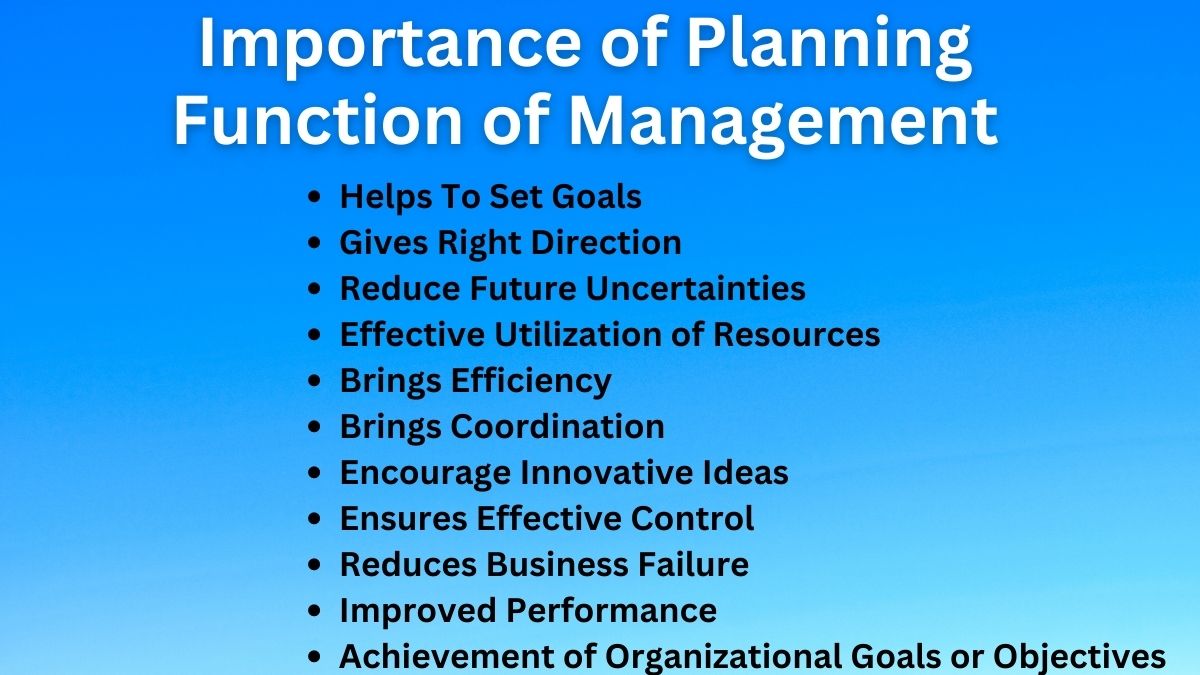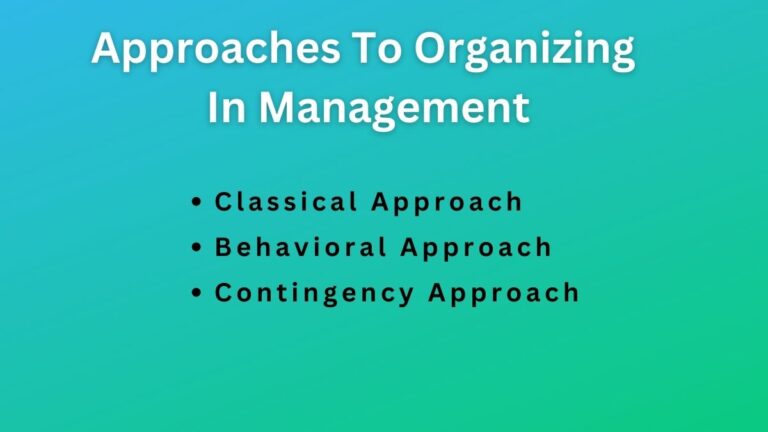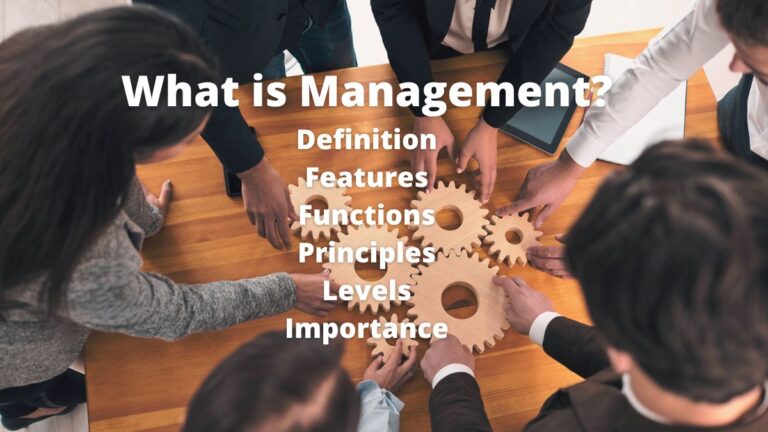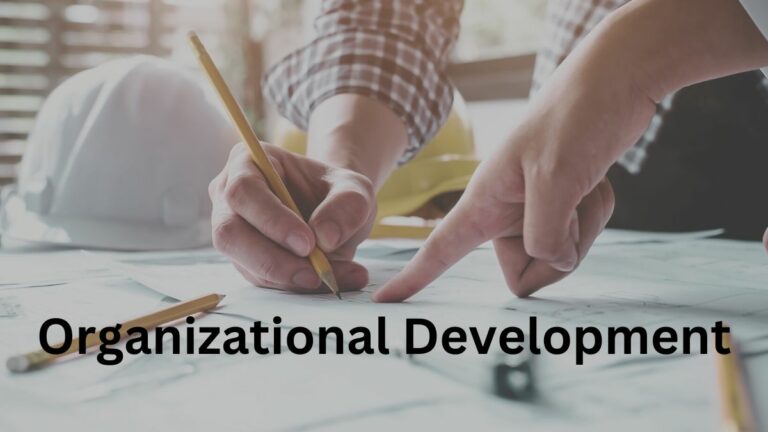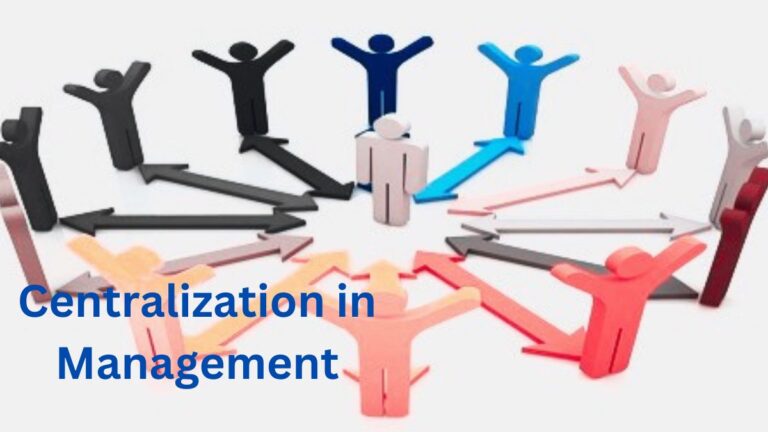11 Importance of Planning Function of Management
Importance of Planning Function
Organizations can be like taking actions and actions but not getting the intended results without planning. Planning is the main function that every organization has to take in order to attain the intended goals. The importance of planning is that it is the means of organizational goal attainment and success.
Planning starts with setting the desired goals of the organization, deciding the necessary courses of measure, and finally ensuring the attainment of those desired goals. The reasons why planning is important for organizational success can be explained by the following 11 points.
Helps To Set Goals
The main function of planning is to analyze the environment and set desired goals or objectives. Goals are the ends to which all organizational efforts are directed.
Planning involves the analysis of environmental factors likely to impact organizational performance like economic factors, political factors, socio-cultural factors, etc. It does a careful study of the organization’s capabilities opportunities and threats in order to construct effective goals.
Gives Right Direction
Another importance of planning is that it gives the right direction to organizational efforts and activities. Planning clearly states what to do and how to do it in order to get the intended results.
With effective planning, employees clearly understand what they have to do and how they can do it in the most promising way. Planning gives proper directions and instructions to every organizational member to effectively execute their tasks.
In addition, when employees clearly know what to do and are given the necessary guidance the overall performance of the organization increases along with them.
Reduce Future Uncertainties
Planning is also called a means to align with environmental change. It is obvious that we all know the business environment has been very dynamic and difficult to forecast.
Planning also forecasts different future likely events and delivers such information to managers. Meaning that when you know the probable uncertainties in the future you can be early prepared to deal with them effectively. And, once these uncertainties come they do not bring many obstacles.
Effective Utilization of Resources
Organizational resources are means to do everything on behalf of the organization. Their effective utilization is as important as the success of the organization. Because the right utilization of organizational resources has a direct connection with organizational goals achievement.
Related: 16 Principles of Planning
Planning as a means of direction and statement to offer the right of way to conduct business activities helps employees to appropriately use the available resources. Along with the effective utilization of resources planning also ensure the minimum wastage of resources.
Brings Efficiency
One of the goals of planning is to ensure efficiency and economy in the organization. As said above, it ensures the optimum utilization of resources and minimizes wastage. Through this, planning leads to increased productivity.
Planning ensures the execution of tasks with the least cost and effort. It increases productivity even with minimum inputs. As such planning results in productivity with the lowest possible costs and efforts which is a sign of efficiency in organizational activities.
Brings Coordination
Planning also helps to ensure effective coordination and cooperation in the workplace. Coordination is the means of doing activities effectively with greater collectiveness. Planning pops up the belief that mutual understanding and cooperation are important for effective plans and the right implementation.
As a pervasive function planning ensures effective collaboration between all levels of managers and invites employees to share their thoughts regarding the plans. Such inclusive nature of planning increases the motivation of employees and they are deemed to be engaged.
Encourage Innovative Ideas
Innovative ideas in planning further improve the plans and their performance. Planning helps managers to give their best creativity and innovativeness while making plans.
As a function of intellectual activity like innovation, creativity, foresight, vision, etc. planning asks managers to show their creativity in designing plans and making decisions. It encourages innovative ideas and solutions in the organization. This also helps in exceeding competitors’ performance in a different way gaining a competitive edge in the market.
Ensures Effective Control
Control involves comparing an employee’s actual performance to the standard ones, identifying any differences, and making the necessary corrections.
Planning provides the criteria by which actual performance is measured. It calculates variances and aids in determining necessary corrections. Planning enhances the control’s effectiveness and significance as a result.
Related: Types of Plans in Organizations
Reduces Business Failure
Along with reducing uncertainties planning is also important for reducing business failures. Planning always aims at making effective plans and ensuring business success.
As it reduces uncertainties, in addition to this, planning helps to select the best option that is effectively tested with likely events (mainly opportunities) and the organization’s capabilities to catch them. Employees also get a clear direction which ensures the effectiveness of plan implementation.
Improved Performance
As planning ensures effectiveness and efficiency in organizational activities it also ensures the effective performance of the organization. When employees really get what they have to do and do it effectively it certainly improves the overall performance of the organization.
Achievement of Organizational Goals or Objectives
As I already said above planning aims to set goals, decide on required activities, and ensure the desired goals or objectives are achieved.
And, all the above-mentioned importance of planning like helping to set goals, giving the right direction, reducing future uncertainties, effective utilization of resources, efficiency, coordination, giving innovative ideas, reducing business failures, effective control, and improving performance are evidence of how planning helps in organizational goals achievement.
Read Next: Planning Process
Sajan Kushmi is a content writer with more than 4 years of experience. He holds BIM Degree. He write on the topics related to Management, Marketing, and Entrepreneurship.
